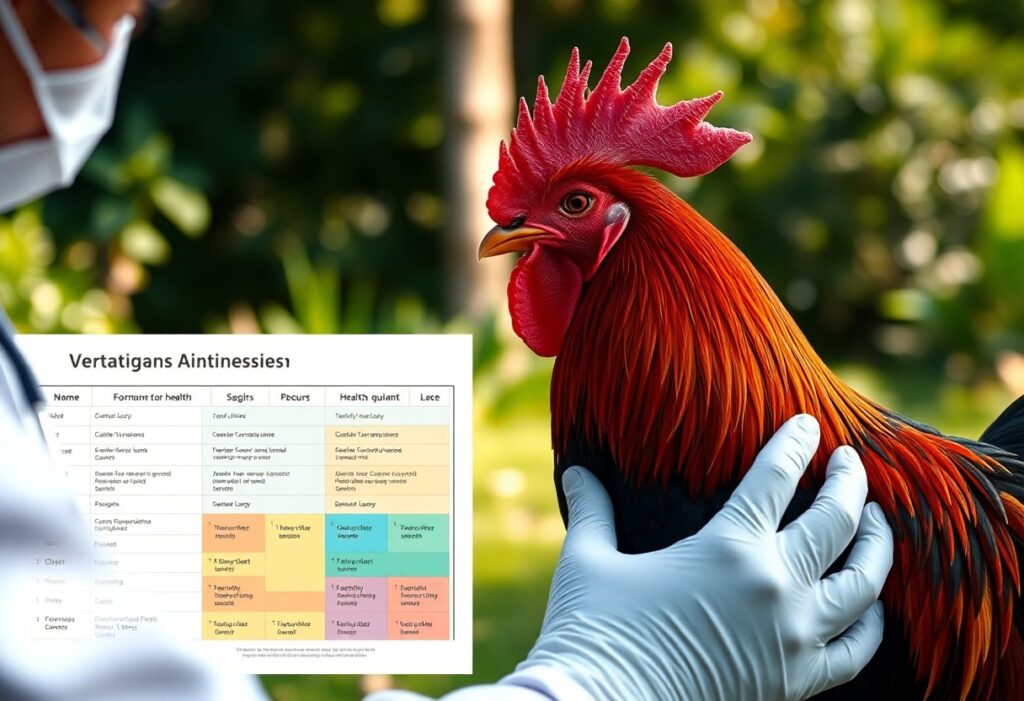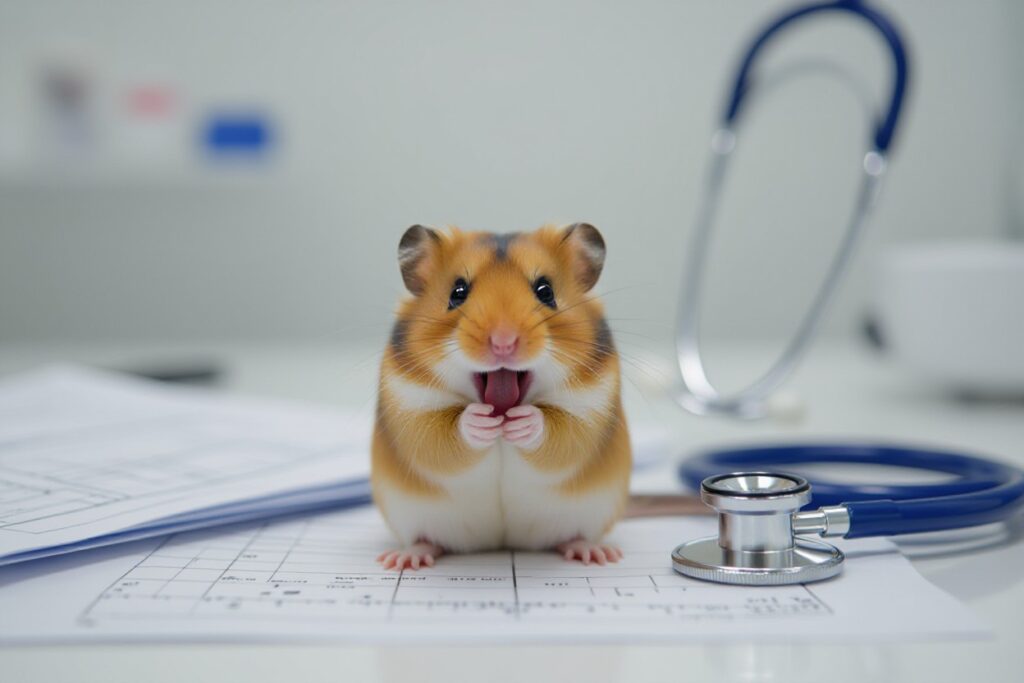Most rooster owners may overlook the importance of maintaining optimal health in their birds, but being vigilant can prevent serious issues down the line. Understanding common health problems, such as respiratory infections and nutritional deficiencies, is vital for ensuring your rooster thrives. In this guide, you’ll learn how to recognize warning signs, implement preventive measures, and provide the best care possible, allowing you to enjoy a healthy, vibrant rooster that contributes positively to your flock. Your proactive approach will significantly impact their well-being and longevity.
Key Takeaways:
- Regular health check-ups can help identify early signs of illness in roosters, allowing for timely intervention and care.
- A balanced diet rich in nutrients is vital to maintain overall health and prevent common diseases in roosters.
- Ensuring a clean and safe living environment helps reduce the risk of infections and improves the overall well-being of roosters.
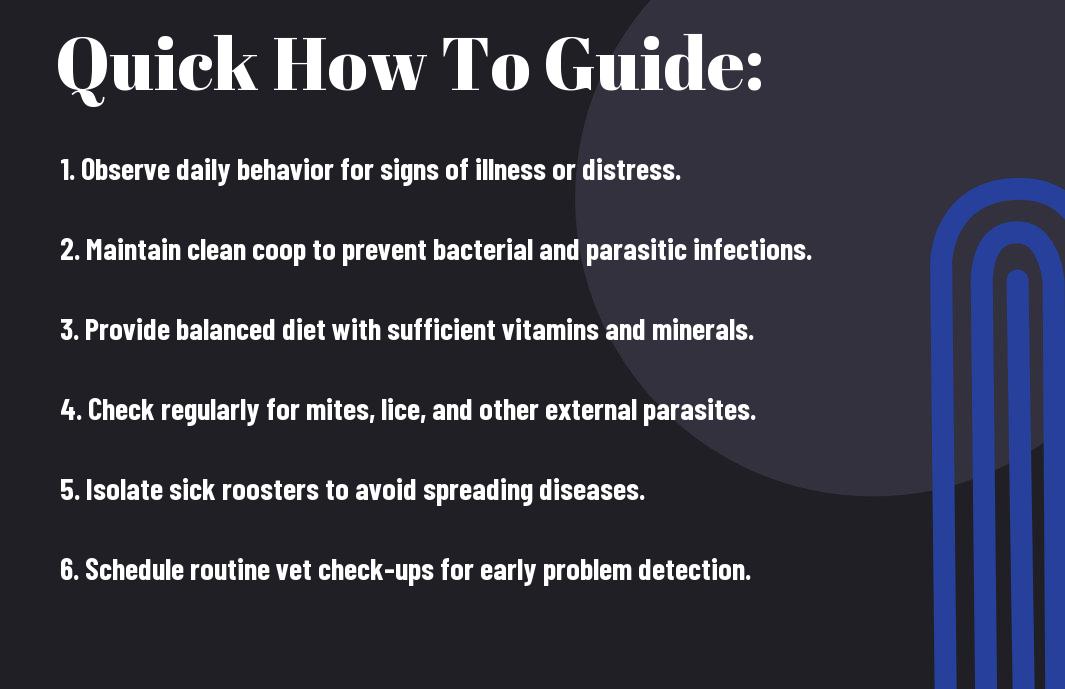
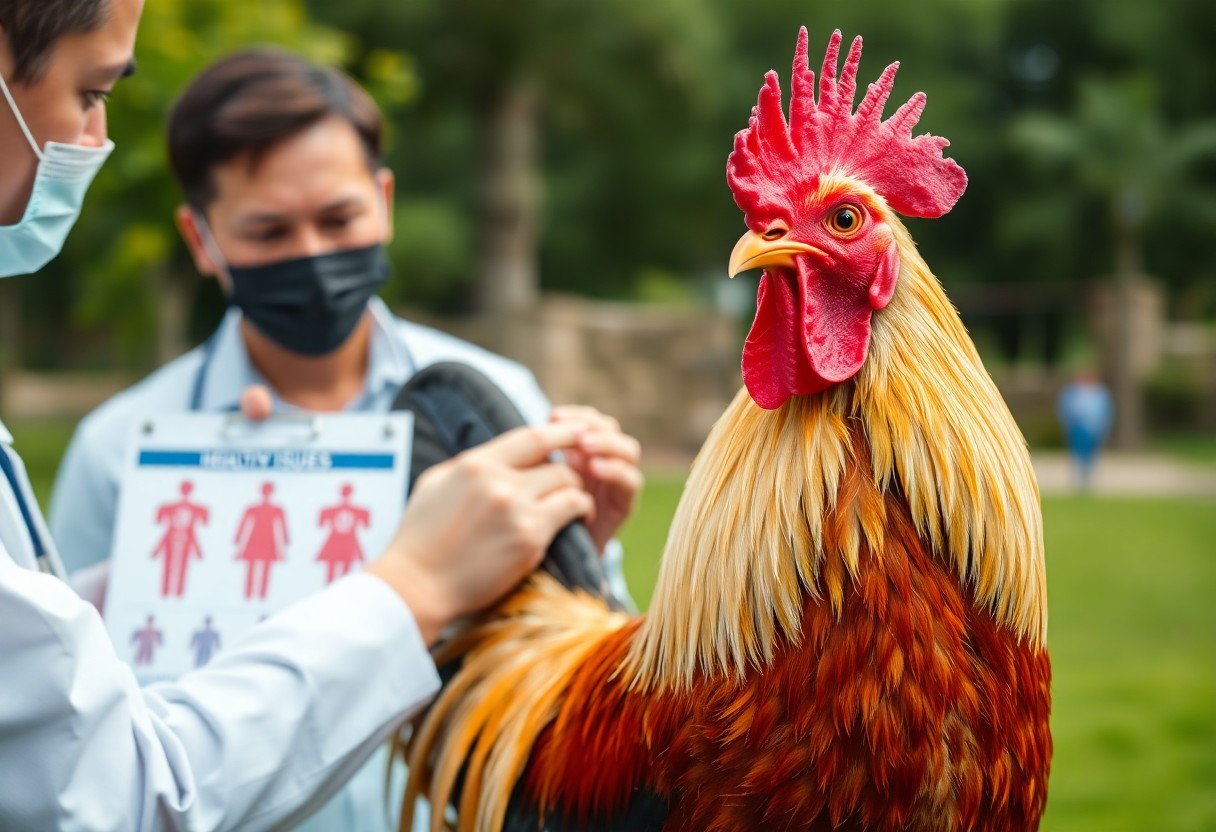
Understanding Common Health Issues in Roosters
While roosters can be hardy animals, they are not immune to various health issues. Common problems such as respiratory infections, parasites, and injuries can significantly impact your rooster’s health and overall well-being. Understanding these issues will empower you to provide better care for your flock, ensuring they remain vibrant and healthy as they contribute to your homestead.
How to Identify Common Health Problems
Clearly, one of the first steps in maintaining your rooster’s health is recognizing the signs of illness. Look out for symptoms such as lethargy, changes in appetite, irregular droppings, and feather loss. Observing these indicators will help you catch problems early, allowing for timely intervention.
Tips for Diagnosing Rooster Illnesses
For effective diagnosis of your rooster’s illnesses, consider the following tips:
- Regular check-ups to monitor health changes
- Closely observing behavior for unusual signs
- Reviewing diet to ensure nutritional needs are met
- Checking for mites or lice that can cause distress
Assume that being proactive in these areas will lead to a healthier and happier rooster.
Understanding specific symptoms can also aid in diagnosing illnesses. Be aware of factors such as environmental conditions and recent changes in your rooster’s routine, which can influence health. Note any abrupt changes in behavior or appearance, as these often indicate underlying issues. Consulting with a vet ensures accurate diagnosis and intervention, vital for your rooster’s recovery.
- Examining droppings for abnormalities
- Observing respiratory patterns for coughs or sneezing
- Monitoring weight for loss or gain
- Checking feathers and skin for signs of infestation
Assume that addressing these changes promptly can prevent more severe health complications.
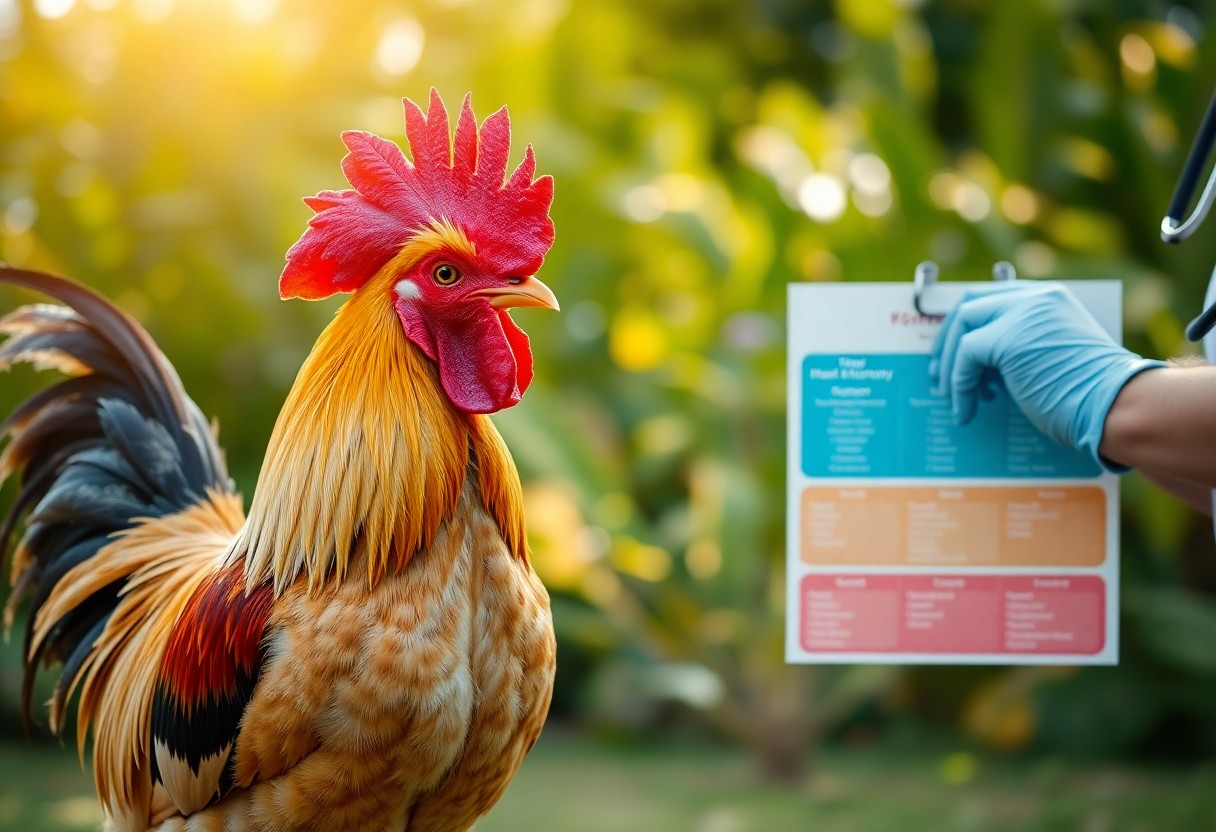
Preventative Care for Rooster Health
It is imperative to implement preventative care measures for your rooster’s overall health and well-being. Regular health checks, proper nutrition, and a clean living environment contribute significantly to reducing potential health risks. Ensuring that your rooster has access to fresh water, a balanced diet, and a safe, stress-free habitat are vital steps you can take to promote good health and longevity.
How to Maintain a Clean Living Environment
Clearly, keeping your rooster’s living space clean is fundamental to preventing diseases. Regularly remove waste, replace bedding, and disinfect water and feeding containers to help eliminate harmful bacteria and parasites. Additionally, ensure that the coop is well-ventilated and provide enough space for your roosters to move around comfortably.
Factors to Consider for Proper Nutrition
Any rooster’s health is significantly impacted by their diet, which must be well-balanced and nutrient-rich. Consider these factors for their nutrition:
- Protein requirements – imperative for growth and reproduction
- Vitamins and minerals – support overall bodily functions
- Fresh greens – provide imperative fiber and nutrients
Knowing the right dietary needs of your rooster will ensure they receive the necessary energy and nutrients.
Plus, understanding your rooster’s specific nutritional requirements plays a significant role in their health. Factors like their age, breed, and purpose (e.g., egg-laying or show purposes) can influence their dietary needs. Ensure you offer a balanced diet filled with high-quality feed, include fresh fruits and vegetables, and provide access to clean water. Knowing the right balance will not only enhance their quality of life, but also prevent common dietary-related health issues.
Recommended Practices for Rooster Care
Once again, it is important to prioritize your roosters’ health and well-being through consistent care practices. Feeding a balanced diet, providing fresh water daily, and ensuring a clean living environment are key aspects of healthy rooster maintenance. Additionally, fostering positive interactions among your flock will help cultivate a harmonious social structure, reducing stress and conflict.
How to Implement Regular Health Checks
Little efforts go a long way in maintaining your rooster’s health. Regularly inspect your rooster for signs of illness, unusual behavior, or physical abnormalities. You should check his feathers, feet, and overall body condition while handling him, and make it a point to observe his eating and drinking habits.
Tips for Managing Stress and Social Dynamics
Regular monitoring of your flock’s interactions is important to prevent stress and maintain a healthy hierarchy. You should implement strategies such as:
- Providing sufficient space to prevent aggression and territorial disputes
- Introducing new birds gradually to reduce stress and ensure smooth integration
- Offering safe, enriching environments to promote physical activity and mental stimulation
Any adjustments to their social environment should be made with care to ensure a positive atmosphere.
Recommended practices for managing stress and social dynamics in your flock include observing daytime interactions and addressing any signs of bullying promptly. By keeping your rooster in a stress-free environment, you’ll encourage healthier behaviors and minimize potential conflicts. Key things to consider:
- Identify and separate aggressive or dominant birds
- Maintain a consistent feeding schedule to reduce competition
- Invest in enriching toys and pecking materials to keep them engaged
Any positive approaches will enhance overall flock health and harmony.
Vaccination and Disease Prevention
Many people underestimate the importance of vaccination in maintaining your rooster’s health. Vaccination not only protects your birds from fatal diseases but also helps in preventing the spread of infections within your flock. By establishing a well-planned vaccination schedule, you can ensure that your roosters remain healthy and productive while minimizing the risk of outbreaks. This proactive approach lowers stress for both you and your birds, ultimately leading to a thriving flock.
How to Create a Vaccination Schedule
For effective disease prevention, it’s vital to create a vaccination schedule tailored for your roosters. Begin by consulting with a veterinarian who can provide guidance on which vaccinations are necessary based on your location, climate, and flock size. Following their advice, you should then mark your calendar with specific dates for administering vaccines to ensure no doses are missed throughout the year.
Tips on Preventing Common Diseases
Even with proper vaccination, you should take additional steps to protect your roosters from common diseases. Implement these preventive measures:
- Maintain clean living conditions to reduce exposure to pathogens
- Introduce biosecurity measures to limit access to your flock
- Provide a balanced diet to support your birds’ immune systems
- Regularly observe your birds for any signs of illness or distress
Any of these actions can significantly enhance your roosters’ overall wellbeing.
Plus, being proactive about disease prevention can save you time and resources in the long run. Maintaining cleanliness in their habitat, providing a nutritionally balanced diet, and practicing biosecurity measures are substantial ways to ensure your flock stays healthy. Taking the time to regularly observe your birds helps catch issues early, allowing for prompt intervention. Any small action can lead to incredible results in keeping your roosters safe and thriving.
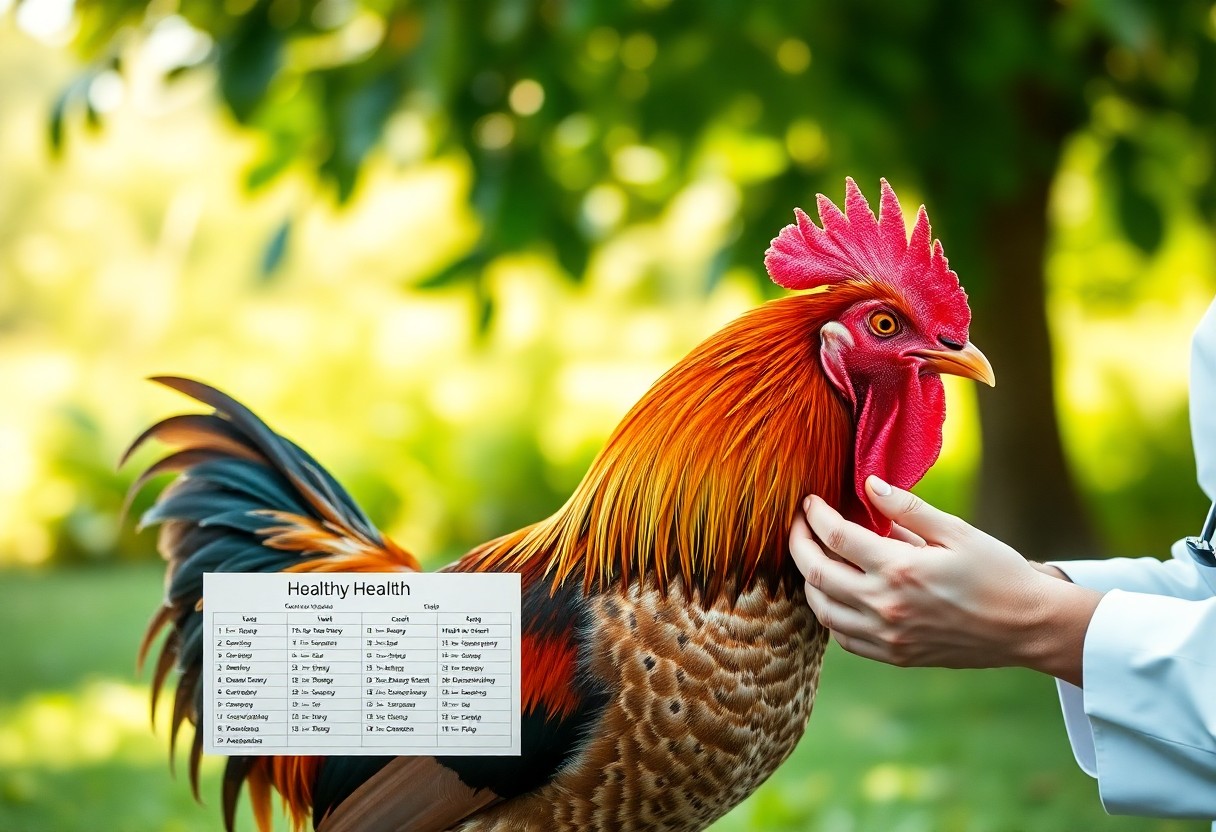
Understanding Behavioral Issues
Not all behavioral issues in roosters are obvious, but understanding them is key to maintaining harmony in your flock. Behavioral problems can manifest in various ways, ranging from aggressive display to poor social interactions. Recognizing these signs early can help you implement preventive measures and foster a healthy environment for your roosters.
How to Recognize Aggressive Behavior
With keen observation, you can identify aggressive behavior in your rooster. Watch for signs such as puffed feathers, prolonged eye contact, and attempts to peck or chase other chickens. Aggressive crowing or territorial displays also indicate dominance and stress within the flock. Being aware of these behaviors will allow you to intervene and prevent escalation.
Tips for Socializing Roosters Effectively
Understanding how to socialize your roosters effectively is vital for maintaining a peaceful flock. Implement these socialization tips to enhance interactions:
- Introduce new roosters gradually to avoid territorial aggression.
- Provide ample space for each rooster to establish their own territory.
- Ensure adequate resources like food and water to minimize competition.
- Spend time with your roosters to build trust and reduce fear.
Knowing how to apply these techniques can vastly improve your flock’s dynamics.
Behavior involves complex interactions, and socializing your roosters effectively can build cooperative relationships among them. Offer consistent training and practice gentle handling, fostering trust. Regularly monitor behaviors to identify issues early, allowing you to respond before conflicts arise. Use structured environments during introductions to help them acclimatize and feel safe. Ensuring a positive atmosphere can significantly reduce stress within your flock. Knowing the nuances of their behavior will empower you to create a harmonious living space.
When to Consult a Veterinarian
Keep an eye on your rooster for any signs of illness or distress. If you notice symptoms such as unusual lethargy, lack of appetite, difficulty breathing, or abnormal droppings, it is crucial to seek veterinary care promptly. Early intervention can prevent minor issues from becoming serious health problems, ensuring your rooster remains healthy and thriving in your care.
How to Choose the Right Avian Vet
Consult with several practitioners to find a veterinarian who specializes in avian care and has experience treating roosters. Look for vets who are compassionate and willing to answer your questions. Checking online reviews and talking to fellow poultry owners can help you ensure your rooster will receive the best care possible.
Tips for Preparing for Your Vet Visit
Right before your appointment, gather all relevant information about your rooster’s health and behavior. Prepare a list of any symptoms you’ve observed and changes in his diet or environment, and bring along records of previous treatments. This preparation can help the veterinarian assess your rooster more effectively.
- Health Records
- Symptom Log
- Dietary Information
- Behavior Changes
The better prepared you are, the more focused the consultation will be.
This preparation can greatly enhance the efficiency of your vet’s visit. Bring a sample of your rooster’s droppings if you can, as this can provide vital information about his health. Don’t hesitate to ask questions during the appointment, as clear communication is key to understanding your rooster’s needs. Make a point of discussing any medications or treatments you may have previously used for your rooster.
- Fecal Samples
- Open Communication
- Prior Medications
- Detailed Symptom Notes
The more information you provide, the better equipped your veterinarian will be to make a diagnosis.
Final Words
Now that you have a clearer understanding of rooster health, including common issues and preventive measures, you are better equipped to ensure your flock thrives. By staying observant, providing a balanced diet, and maintaining a clean living environment, you can effectively minimize health problems. Regular check-ups and being knowledgeable about your birds’ behaviors will further enhance their wellbeing. Taking these steps will lead to healthier, happier roosters and a more productive poultry experience.
FAQ
Q: What are the common health issues that roosters face?
A: Roosters can experience a variety of health issues, some of which are quite common. These include respiratory infections, which can be caused by poor ventilation or overcrowding; parasite infestations, such as mites and worms; and injuries related to aggressive behavior, both towards other birds and during mating. Feather plucking and balding can also occur, often due to stress or nutritional deficiencies. Monitoring your rooster’s behavior and physical appearance is key to identifying these issues early.
Q: How can I prevent respiratory problems in my rooster?
A: Preventing respiratory issues in roosters involves ensuring a clean and well-ventilated living environment. Regularly clean the coop to minimize dust and ammonia buildup, which can irritate the respiratory tract. Providing ample space is important, as overcrowding can lead to increased stress and transmission of diseases. Additionally, avoid introducing new birds without proper quarantine to prevent the spread of infections. Pay attention to your rooster’s diet, as a well-balanced nutrition can help strengthen their immune system.
Q: What nutritional needs are vital for maintaining a healthy rooster?
A: A healthy diet is vital for a rooster’s overall well-being. It should include a balanced mixture of good-quality commercial feed formulated for poultry, which typically contains proteins, vitamins, and minerals. Supplementing with fresh fruits, vegetables, and greens will provide additional nutrients and help prevent deficiencies. Calcium is especially important for roosters during mating season, so adding sources like crushed oyster shells can be beneficial. Ensuring they have constant access to clean, fresh water is also vital for their health.
